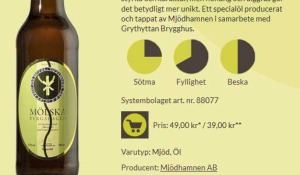
Monopoly on pie charts? You must be kidding!
No, I am not kidding. The very small company called Mjödhamnen is threatened with a law suit by the very big monopoly retailer Systembolaget in Sweden. Mjödhamnen means “the port of mead” and is a

No, I am not kidding. The very small company called Mjödhamnen is threatened with a law suit by the very big monopoly retailer Systembolaget in Sweden. Mjödhamnen means “the port of mead” and is a
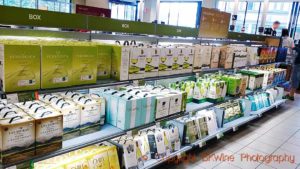
No, it’s no April Fool’s joke. From 1 April 2015, it will be allowed for grocery stores to sell alcohol, wine and liquor, according to a recent decision by the government. In order to sell
The harvesting machine today replaces hand harvesting in many places around the world. And harvesting machines are not only for simple wines. Small, efficient and gentle machines are also seen in densely planted vineyards where
The best-selling sparkling wine in the United States, excluding champagne, is nevertheless a champagne. The brand André, owned by the giant E & J Gallo, is a California Champagne which also is clearly stated on
Finally it’s official. The wine belongs to the French cultural heritage. On July 9, the French wine industry had a reason to celebrate. On that day it was confirmed, finally, by the parliament that the
On August 1, it will cease to be mandatory for winemakers in France to deliver their pressed skins to a distillery. This means that growers now have several options for what to do with the
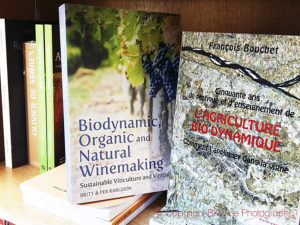
We are very happy to announce that our first book in English is soon to be published. The book is called “Biodynamic, organic and natural winemaking. Sustainable viticulture and viniculture.” It is published by Floris
Should spraying by helicopter or air-plane be banned? Yes, says Segolène Royale, the French Minister for ecology, sustainability and energy (as well as ex-presidential candidate and ex-partner of the current president). There is actually already
There is a vicious power game going on behind the beautiful chateaux façades of Bordeaux. At least according to Isabelle Saporta, a French journalist who has written an intriguing book about this particular subject. Among
No, more likely by copper. Many organic growers survive thanks to the permission they have to spray with copper against the severe fungal disease mildiou. This applies not least to the organic growers in Burgundy
Côte and Coteaux, we see these words everywhere: Côtes du Rhône, Coteaux du Languedoc, Côte des Blancs, Côte de Beaune, etc. It is an old French tradition to call wine regions located along rivers or
If everything goes according to plan world wine trade statistics is set to become more reliable. Bag-in-box wine will no longer be considered as bulk wine. One of the best sources of wine trade statistics
The French Ministry of Agriculture is discussing a decision to ban nitrogen fertilisation to farmland with an inclination of more than 15 %. This is to reduce nitrate emissions into the environment. This has naturally
Champagne has now decided how many kilos of grapes that growers will be allowed to pick this fall. Champagne differs from other districts in France when it comes to determining the yield. In Champagne they
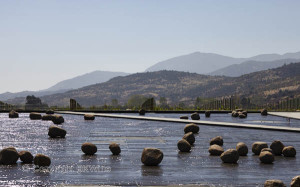
Irrigation in the vineyards is no longer taboo in France, nor is it prohibited. (It is curious how often one still hear people saying that irrigation in France, or even in Europe, is not permitted.
The planting rights in the EU were supposed to disappear. The decision was taken. And then it would have been possible for wine growers to plant more grapes if they thought they could sell more
Sometimes winemakers ask us about the rules around sending wines to Sweden. Most know that there is a monopoly in Sweden but they also have customers from Sweden asking for shipments. In fact, although there
China has recently recognized the appellation Champagne. This means that in future in China you will not see any Chinese bubbles, or imported ones for that matter, that is labelled as Champagne if they do

In recent years, many new wine laws have been introduced in the EU. Among other things, the rules for “wines without geographical origin” have changed. These used to be called vin de table in France
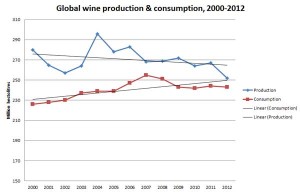
Bringing it all together: conclusions on the world wine industry situation 2000-20012 Europe is slowly losing its dominant position both as a vine grower, wine maker and consumer. The New World is gaining share. The
The EU will not abolish planting rights as agreed, but only relax it a bit It seems that the EU countries have agreed to a change in the planting rights system in the current round
There are currently several ways for Swedes to buy wine, although there is supposedly a monopoly. “Direct import”, where you order wine from another country, from a winery or a wine shop, is one. Here
France (and some other major European wine countries) is fighting tooth and nail to maintain planting rights in Europe. And even though they have managed to obtain an extension they are far from satisfied. The

How provincial protectionism makes it more difficult to sell French wines Vin de France, that is the new name for “vin de table” (wine without a specific appellation, AOP, or IGP), can now have the
Quite some time back I wrote a guest article on the blog Les 5 du Vin on planting rights. They have moved the blog to a new platform and the article seems to have disappeared.
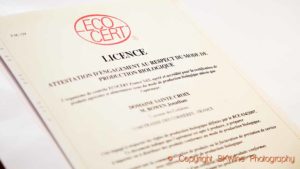
It is best to judge organic wines on their quality, not by a philosophy Do wine consumers have greater expectations when they drink organic wines? Sometimes it feels that way. They should not. It is
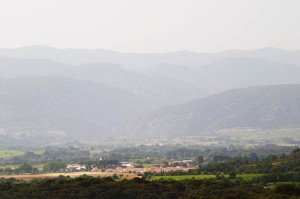
The usual infighting between French appellations… Renaming the French table wines to Vin de France was an ingenious move. They were formerly called vin de table, wines without geographical origin. “France” is a brand name
During the launch of the new vintage of Chianti Classico, the “anteprima” or the “primeurs”, in mid-February in Florence the consorzio presented the new design of the black rooster, the gallo nero symbol of Chianti Classico.
There have been more reactions to the EU rules for organic wines. The French company Oenodia is upset about the fact that the rules ban organic wines from using electro-dialysis. Oenodia specializes in the treatment
Americans must learn to respect names of origin. The Champagne Bureau USA has tried before to teach them and now it is trying again. A new advertising campaign has just been launched in the United

No, I am not kidding. The very small company called Mjödhamnen is threatened with a law suit by the very big monopoly retailer Systembolaget in

No, it’s no April Fool’s joke. From 1 April 2015, it will be allowed for grocery stores to sell alcohol, wine and liquor, according to
The harvesting machine today replaces hand harvesting in many places around the world. And harvesting machines are not only for simple wines. Small, efficient and
The best-selling sparkling wine in the United States, excluding champagne, is nevertheless a champagne. The brand André, owned by the giant E & J Gallo,
Finally it’s official. The wine belongs to the French cultural heritage. On July 9, the French wine industry had a reason to celebrate. On that
On August 1, it will cease to be mandatory for winemakers in France to deliver their pressed skins to a distillery. This means that growers

We are very happy to announce that our first book in English is soon to be published. The book is called “Biodynamic, organic and natural
Should spraying by helicopter or air-plane be banned? Yes, says Segolène Royale, the French Minister for ecology, sustainability and energy (as well as ex-presidential candidate
There is a vicious power game going on behind the beautiful chateaux façades of Bordeaux. At least according to Isabelle Saporta, a French journalist who
No, more likely by copper. Many organic growers survive thanks to the permission they have to spray with copper against the severe fungal disease mildiou.
Côte and Coteaux, we see these words everywhere: Côtes du Rhône, Coteaux du Languedoc, Côte des Blancs, Côte de Beaune, etc. It is an old
If everything goes according to plan world wine trade statistics is set to become more reliable. Bag-in-box wine will no longer be considered as bulk
The French Ministry of Agriculture is discussing a decision to ban nitrogen fertilisation to farmland with an inclination of more than 15 %. This is
Champagne has now decided how many kilos of grapes that growers will be allowed to pick this fall. Champagne differs from other districts in France

Irrigation in the vineyards is no longer taboo in France, nor is it prohibited. (It is curious how often one still hear people saying that
The planting rights in the EU were supposed to disappear. The decision was taken. And then it would have been possible for wine growers to
Sometimes winemakers ask us about the rules around sending wines to Sweden. Most know that there is a monopoly in Sweden but they also have
China has recently recognized the appellation Champagne. This means that in future in China you will not see any Chinese bubbles, or imported ones for

In recent years, many new wine laws have been introduced in the EU. Among other things, the rules for “wines without geographical origin” have changed.

Bringing it all together: conclusions on the world wine industry situation 2000-20012 Europe is slowly losing its dominant position both as a vine grower, wine
The EU will not abolish planting rights as agreed, but only relax it a bit It seems that the EU countries have agreed to a
There are currently several ways for Swedes to buy wine, although there is supposedly a monopoly. “Direct import”, where you order wine from another country,
France (and some other major European wine countries) is fighting tooth and nail to maintain planting rights in Europe. And even though they have managed

How provincial protectionism makes it more difficult to sell French wines Vin de France, that is the new name for “vin de table” (wine without
Quite some time back I wrote a guest article on the blog Les 5 du Vin on planting rights. They have moved the blog to

It is best to judge organic wines on their quality, not by a philosophy Do wine consumers have greater expectations when they drink organic wines?

The usual infighting between French appellations… Renaming the French table wines to Vin de France was an ingenious move. They were formerly called vin de
During the launch of the new vintage of Chianti Classico, the “anteprima” or the “primeurs”, in mid-February in Florence the consorzio presented the new design
There have been more reactions to the EU rules for organic wines. The French company Oenodia is upset about the fact that the rules ban
Americans must learn to respect names of origin. The Champagne Bureau USA has tried before to teach them and now it is trying again. A
Newsletter:
Get our free monthly newsletter, the BKWine Brief and join 25,000 other wine and travel enthusiasts.
Text and images may not be used without our permission. More info on copyright.